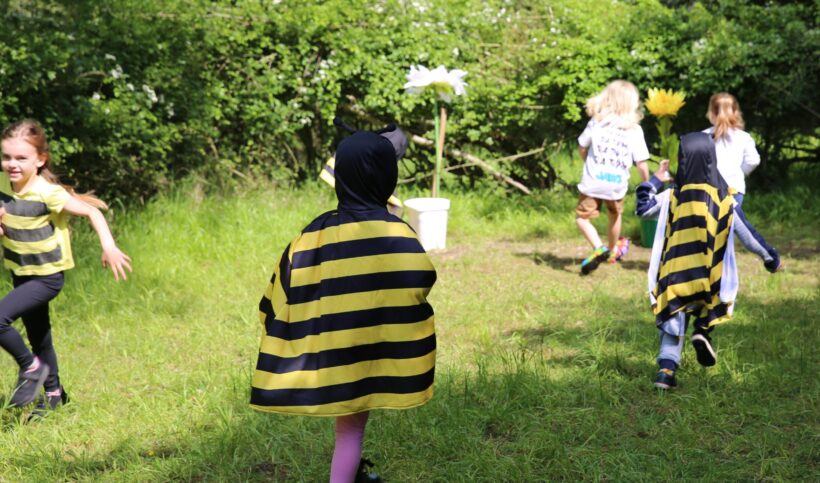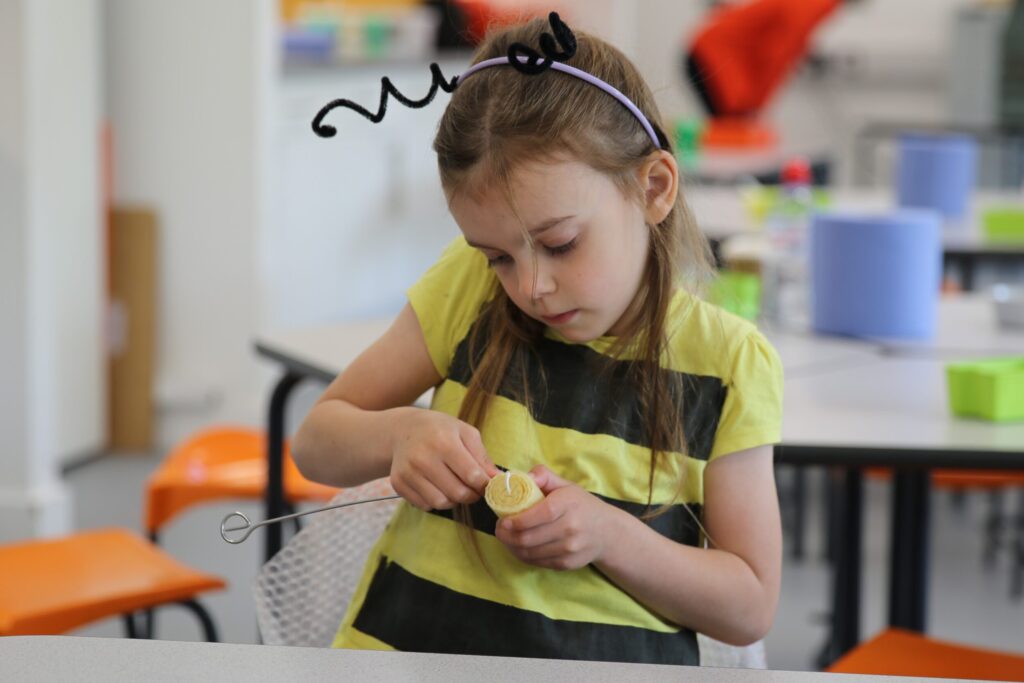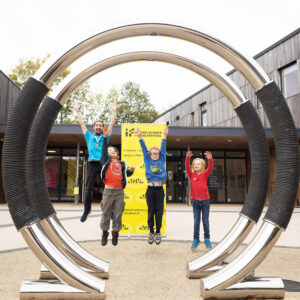The super buzz of World Bee Day
Monday 20th May 2024

We love the buzz of energy every Saturday in the Science Oxford Centre, as families share in the excitement of discovering and exploring science. There is always an buzz with the celebration of World Bee Day on 20th May.
In the summer of 2021, the first beehive was established at the Centre with the help of beekeeper Richard Stansfield and the Oxford Beekeepers Association, who have continued to help us look after them ever since. Although May is a busy month for beekeepers, Richard has joined us on a number of Family Days and Nature Clubs at the Science Oxford Centre to celebrate World Bee Day with us and share his knowledge about bees.
Sparking curiosity
An observational hive (see the video) shows what the inside of a beehive looks like and how bees behave in the hive and around the queen bee. One can even see the queen bee lay her eggs. This close-up view into the home of bees is an extraordinary sight and sparks children’s (and adults’) curiosity for bee facts.
Did you know that the queen bee gives off special chemicals called pheromones? Richard explains that when bees ‘lick’ the queen and then move around the hive, they spread her pheromones. This helps keep the colony together.
Bees have a special ‘honey stomach’, where they store nectar and water they collect from flowers. When they go back to the hive, they regurgitate what they have collected so it can be processed into honey, which is stored in the honeycomb for food for winter.
But we shouldn’t feed honey to bees. The sugar in honey is too concentrated, so bees need to dilute it before they can use it as food. However, even if we were to dilute honey from a bottle, it isn’t a good idea to offer it to tired bees. This is because we don’t always know where the honey comes from and it could possibly carry diseases that may be harmful to the bees.
Can you taste the woodland?
Although making honey isn’t the only valuable thing bees do, we do enjoy tasting the sweet treats their hard work provides. The tasting of the honey collected from our hives is a delight. Honey takes on flavours from the nectar and pollen it is made from, so our honey has a lovely taste of the trees and flowers around the woodland at the Science Oxford Centre.
Not all bees make honey
While the bee we are most familiar with is the honeybee, there are about 25,000 types of bees in the world. Not all bees are social and live in colonies with a queen like honeybees. In fact, about 90% of bees are solitary, living by themselves and building homes for their offspring one by one. Solitary bees nest in all sorts of places: walls, underground, holes in wood and stems and even snail shells! Most types of bees don’t make honey, but they are all extraordinary pollinators.
Extraordinary senses of bees
Bees are intelligent; they can remember patterns and smells; they solve mazes; they can use simple tools; and can even recognise human faces! It is also likely that bees can feel pain.
When looking for nectar, a good sense of smell comes in handy. A honeybee has a much better sense of smell than we do, being 100 times more sensitive. In fact, their sense of smell is so good that scientists have used bees to detect chemicals associated with cancer and with diabetes on patients’ breath and also to detect the presence of high explosives. Bees have an amazing sense of touch and can feel tiny ridges on the petals of flowers. And they see colours differently than we do.
Read more interesting information about bees in this article in The Conversation.
Why World Bee Day?
World Bee Day on 20 May is a day designated by the United Nations to raise awareness about the importance of bees, as well as other pollinators, for us and our planet, and why we need to work to protect them from the threat they are under.
Bees are among the most important pollinators of plants. Without pollination, there would be no seeds, and without seeds, plants would not reproduce and continue to survive from one generation to the next.
Bees help pollinate nearly a third of all the food people eat around the world. The sweet summer blueberries, that delicious crispy apple, the crunchy almonds and even that vegetable you either love or love to hate, the brussels sprouts, are all nutritious foods pollinated by bees.
Bees and other insects are essential for conserving biodiversity. Did you know that nearly 90% of the world’s wild flowering plant species depend entirely, or at least in part, on animal pollination? Bees’ role as pollinators supports whole ecosystems, and ultimately, the health of the planet.
But many insect pollinators, particularly bees and butterflies, are under threat and face extinction. Pesticides, parasites, higher temperatures associated with climate change, habitat loss and intensive farming practices all pose problems for bee populations.
So what can we do to help bees?
- Plant native plants in your gardens, which flower at different times of the year;
- Build an ‘insect hotel’ in your garden for solitary bees (and other nesting insects) with stems, twigs and wood block;
- Buy raw honey from local farmers;
- Try not to use pesticides, fungicides or herbicides in your garden;
- Help bees rehydrate by making a bee water fountain outside – a water bowl with stones and twigs to help a bee climb out;.
- Where you have the choice, buy your food from sustainable agricultural practices;
- Tell your friends and neighbours what they can also do to help bees.
Bee activities

If would like to do some activities at home, we recommend some of the activities put together by the British Beekeepers Association. Click here for a link.
Would you like to find out more facts about bees? Visit Buzz About Bees for some interesting facts!



